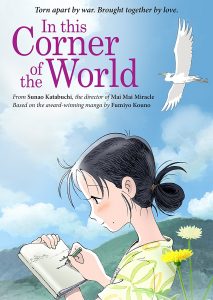JQ Magazine: Film Review — ‘In This Corner of the World’

“In This Corner of the World is more than a good story with vibrant animation. It is a thoughtful work of art that holds its own against the other big anime hit of 2016, Your Name.” © Fumiyo Kouno/Futabasha/Konosekai no Katasumini Project
By Preston Hatfield (Yamanashi–ken, 2009-10) for JQ magazine. Preston is the English teacher you wish you had growing up. He taught in Kofu, Yamanashi on JET and later received his Master’s in Education and teaching credential from Stanford University. He now teaches English at a public high school in the Silicon Valley, and is inspiring the leaders of tomorrow one dank meme at a time.
Raise your hand if you remember how it felt to watch Grave of the Fireflies. It isn’t often that you’re truly glad to have watched a film that slowly rips your heart out, but the iconic 1988 film about Japan during World War II did exactly that for generations of viewers. Nearly 30 years later, director Sunao Katabuchi (Mai Mai Miracle) has created his own anime masterpiece that is every bit as poignant, tragic and beautiful as Grave of the Fireflies.
Based on the award-winning manga by Fumiyo Kouno, In This Corner of the World follows Suzu, an 18-year-old girl from Hiroshima, as she is plucked from her life by a man she only vaguely knows and moves in with his family in the nearby naval port city of Kure. As Suzu acclimates to life with her new family, the audience gets a look at the daily ins and outs of domestic life for Japanese women at the time, from tending the garden and collecting locally grown plants to make their meals, to refashioning kimonos into trousers and robes. Suzu also struggles with learning how to be a good wife and ingratiating herself to her new in-laws and her husband’s hypercritical sister.
In the latter half of the film, Katabuchi shows how the war progressively deteriorates the Japanese’s sense of normalcy, comfort, and security. What was once a quaint seaside naval town is reduced to a scene of waking nightmare and blazing fire. There are incessant air raid sirens and evacuations to bomb shelters, government propaganda, espionage hysteria, overcrowded hospitals, and the incomprehensible annihilation of cities and the people who populate them. But despite a number of somber (if not heart-wrenching) moments, In This Corner of the World ends the way most of us wish Grave of the Fireflies could have ended, and that small dose of optimism makes the film much easier to sit with when the credits roll.
While at 129 minutes it is not a short movie, Katabuchi is so effective with his storytelling that the audience gets the sense that they have spent more time with Suzu than they actually have. Indeed, watching the seasons drift into years feels like complete immersion in time and place. For every bomb that drops there a pot of rice boiling over a fire; the scent of green tea is offset with the acrid smell of burnt flesh and smoke; and every moment of adult hardship is balanced with reprieves of childish whimsy. The characters are three-dimensional, and even those who only make brief appearances make an impression, both to Suzu and to the audience.
Another praise-worthy element of Katabuchi’s craft is how he expands Suzu’s drawing hobby beyond a mere feature of her character and makes it a plot device and symbol, even artfully incorporating it into the film’s animation at strategic moments. Everything about the film feels painstakingly researched, premeditated, and mission-driven. According to an interview he did with FUNimation, when Kitabuchi set out to animate the film, he first studied the geography of the land and the pictures that existed at that time so he could create an accurate portrayal of the time and place. When it came to representing the events of the war and what it was like for those who lived through it, the director mentioned that he felt a big responsibility to get the facts right, and as such, he and his team conducted interviews with people who were children in that period to get a sense of what their lives were like before, during, and after the war.
In This Corner of the World is more than a good story with vibrant animation. It is a thoughtful work of art that, in this writer’s opinion, holds its own against the other big anime hit of 2016, Your Name.
For more on In This Corner of the World, click here.
For more JQ film reviews, click here.


Comments are closed.